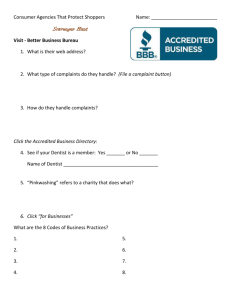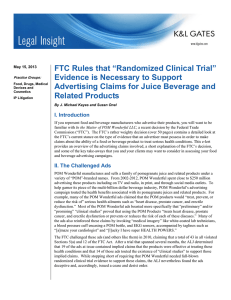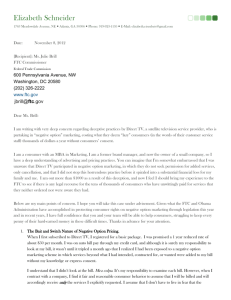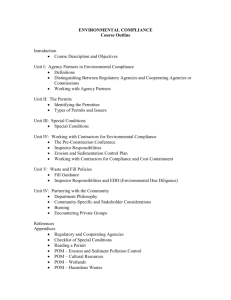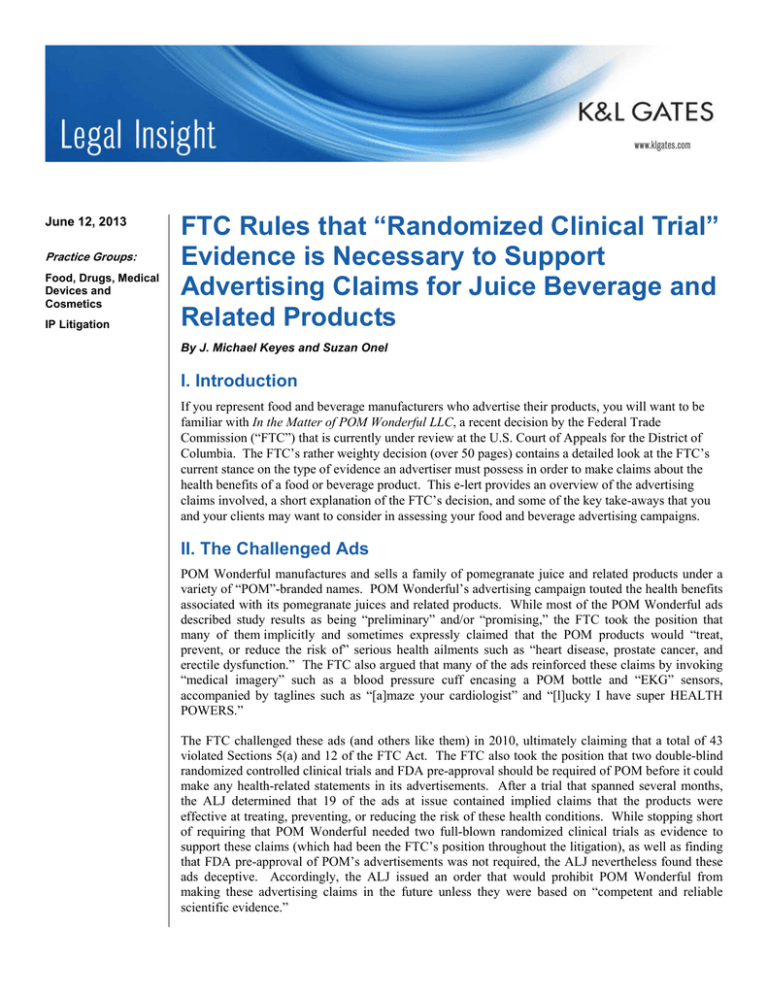
June 12, 2013
Practice Groups:
Food, Drugs, Medical
Devices and
Cosmetics
IP Litigation
FTC Rules that “Randomized Clinical Trial”
Evidence is Necessary to Support
Advertising Claims for Juice Beverage and
Related Products
By J. Michael Keyes and Suzan Onel
I. Introduction
If you represent food and beverage manufacturers who advertise their products, you will want to be
familiar with In the Matter of POM Wonderful LLC, a recent decision by the Federal Trade
Commission (“FTC”) that is currently under review at the U.S. Court of Appeals for the District of
Columbia. The FTC’s rather weighty decision (over 50 pages) contains a detailed look at the FTC’s
current stance on the type of evidence an advertiser must possess in order to make claims about the
health benefits of a food or beverage product. This e-lert provides an overview of the advertising
claims involved, a short explanation of the FTC’s decision, and some of the key take-aways that you
and your clients may want to consider in assessing your food and beverage advertising campaigns.
II. The Challenged Ads
POM Wonderful manufactures and sells a family of pomegranate juice and related products under a
variety of “POM”-branded names. POM Wonderful’s advertising campaign touted the health benefits
associated with its pomegranate juices and related products. While most of the POM Wonderful ads
described study results as being “preliminary” and/or “promising,” the FTC took the position that
many of them implicitly and sometimes expressly claimed that the POM products would “treat,
prevent, or reduce the risk of” serious health ailments such as “heart disease, prostate cancer, and
erectile dysfunction.” The FTC also argued that many of the ads reinforced these claims by invoking
“medical imagery” such as a blood pressure cuff encasing a POM bottle and “EKG” sensors,
accompanied by taglines such as “[a]maze your cardiologist” and “[l]ucky I have super HEALTH
POWERS.”
The FTC challenged these ads (and others like them) in 2010, ultimately claiming that a total of 43
violated Sections 5(a) and 12 of the FTC Act. The FTC also took the position that two double-blind
randomized controlled clinical trials and FDA pre-approval should be required of POM before it could
make any health-related statements in its advertisements. After a trial that spanned several months,
the ALJ determined that 19 of the ads at issue contained implied claims that the products were
effective at treating, preventing, or reducing the risk of these health conditions. While stopping short
of requiring that POM Wonderful needed two full-blown randomized clinical trials as evidence to
support these claims (which had been the FTC’s position throughout the litigation), as well as finding
that FDA pre-approval of POM’s advertisements was not required, the ALJ nevertheless found these
ads deceptive. Accordingly, the ALJ issued an order that would prohibit POM Wonderful from
making these advertising claims in the future unless they were based on “competent and reliable
scientific evidence.”
FTC Rules that “Randomized Clinical Trial” Evidence is
Necessary to Support Advertising Claims for Juice
Beverage and Related Products
Both the FTC and POM appealed the case to the full commission.
III. The FTC Decision and the Key Take-Aways
The FTC Commission reviewed the ALJ’s Initial Decision, revisiting each of the ads at issue, the
messages conveyed therein, and the underlying substantiation for the advertising claims as introduced
at trial. The FTC went further than the ALJ and found that 36 of the 43 ads were deceptive. Although
an in-depth review of the FTC order with respect to the individual ads is beyond the scope of this elert, there are some key take-aways that are valuable for the industry to consider when developing
marketing and ad campaigns.
First, the FTC found that most of POM’s challenged ads contained “establishment” claims in that they
conveyed the message that POM products were “clinically proven” to treat, prevent, or reduce the risk
of heart disease, prostate cancer, and erectile dysfunction. According to the FTC, when an advertiser
claims, expressly or implicitly, that its food or beverage products treat, prevent, or reduce “serious
diseases” such as the ones at issue, the advertiser must have “Randomized Clinical Trial” (“RCT”)
evidence to support those advertising claims.
A properly structured RCT will select participants randomly, will be double-blind, and will have both
a test group and a control group. While POM Wonderful produced expert testimony regarding the
limitations of RCTs in connection with the study of the health benefits of foods, the value of in vitro,
animal, and small-scale human studies, and the actual “health benefits” associated with pomegranates
and pomegranate juice, the FTC found POM’s scientific substantiation did not provide sufficient
support for its advertising claims and required that POM have RCTs for its claims. The final order
requires “at least two [RCTs] of the covered product that are randomized, well controlled, based on
valid end points, and conducted by persons qualified by training and experience to conduct such
studies.” This represents a tougher standard than what the ALJ required, i.e., competent and reliable
clinical evidence, but not necessarily RCTs. Notably, this new standard closely tracks the “gold
standard” used by the FTC for drug claims and language appearing in recent consent decrees.
Nevertheless, the FTC rejected the notion that requiring RCTs for food product health claims rises to
the same level as the FDA’s standards for proof of drug claims. The Commission stated it was not
holding POM Wonderful to a pharmaceutical standard because the FDA regulations for drugs require
multiple phases of clinical trials producing different and greater substantiation than what the FTC
required of POM Wonderful.
Thus, the key holding in the decision makes it clear that when an advertiser claims a food or beverage
product provides any health-related benefits, it implicitly sends the message to consumers that the
product treats, reduces, or prevents serious diseases, for which the FTC is going to expect robust
substantiation in the form of RCTs.
Second, consistent with prior FTC precedent, the decision underscores that when reviewing an ad for
compliance with the FTC Act, it is necessary to consider the entire “gestalt” of the ad itself instead of
considering individual elements. This principle was particularly important here because although
some of the ads did not expressly rely on “scientific” evidence per se, the imagery and creative
execution of those ads, particularly when combined with the text, could leave consumers with the
impression that using the POM products at issue would be effective at treating, preventing, or
reducing the risk of disease. For example, a POM bottle in the shape of an intravenous bag, the use of
the caduceus (a well-recognized symbol of the medical profession), and stethoscope all reinforced the
2
FTC Rules that “Randomized Clinical Trial” Evidence is
Necessary to Support Advertising Claims for Juice
Beverage and Related Products
message that the products at issue were effective in treating or preventing the serious health conditions
that were mentioned in the ads. The FTC’s treatment of the imagery is an important reminder that the
visual effects of an ad simply cannot be divorced from the text. The unitary whole should always be
considered.
Finally, the FTC decision also discusses the use of “qualifiers.” In several of the ads, the scientific
evidence relied upon was characterized as “preliminary,” “promising,” “encouraging,” or “hopeful.”
POM Wonderful argued that because it qualified the nature of the clinical studies in this way, these
particular ads were not making “establishment claims.” The FTC rejected the argument, finding that
POM Wonderful’s “use of one or two adjectives does not alter the net impression that clinical studies
prove their claims. This is especially true when the chosen adjectives - promising, encouraging, or
hopeful - provide a positive spin on the studies rather than a substantive disclaimer.”
IV. Conclusion
In the Matter of POM Wonderful LLC is an important decision to keep in mind when considering the
type of health and wellness claims that can be made when it comes to food and beverage products.
The claim-substantiation standard appears to have been raised to a level that is closer to what is
required of drug claims, but that is applied here across product lines to food and beverage products. If
the advertising claims implicitly or expressly assert that the product helps treat, prevent, or reduce the
risk of a serious health condition, then it will be necessary to support those claims with well-designed
and well-executed RCTs.
POM filed a petition for review of the FTC’s Order in the D.C. Circuit on March 8, 2013; the briefing
schedule closes in October 2013, with a decision on the merits to be issued thereafter.
If you have any questions regarding the matter addressed in this alert, please contact Mike Keyes or
Suzan Onel.
3
FTC Rules that “Randomized Clinical Trial” Evidence is
Necessary to Support Advertising Claims for Juice
Beverage and Related Products
Authors:
J. Michael Keyes
mike.keyes@klgates.com
+1.509.241.1527
Suzan Onel
susan.onel@klgates.com
+1.202.778.9134
Anchorage Austin Beijing Berlin Boston Brisbane Brussels Charleston Charlotte Chicago Dallas Doha Dubai Fort Worth Frankfurt
Harrisburg Hong Kong Houston London Los Angeles Melbourne Miami Milan Moscow Newark New York Orange County Palo Alto Paris
Perth Pittsburgh Portland Raleigh Research Triangle Park San Diego San Francisco São Paulo Seattle Seoul Shanghai Singapore Spokane
Sydney Taipei Tokyo Warsaw Washington, D.C. Wilmington
K&L Gates practices out of 48 fully integrated offices located in the United States, Asia, Australia, Europe, the
Middle East and South America and represents leading global corporations, growth and middle-market companies,
capital markets participants and entrepreneurs in every major industry group as well as public sector entities,
educational institutions, philanthropic organizations and individuals. For more information about K&L Gates or its
locations, practices and registrations, visit www.klgates.com.
This publication is for informational purposes and does not contain or convey legal advice. The information herein should not be used or relied upon in
regard to any particular facts or circumstances without first consulting a lawyer.
©2013 K&L Gates LLP. All Rights Reserved.
4


